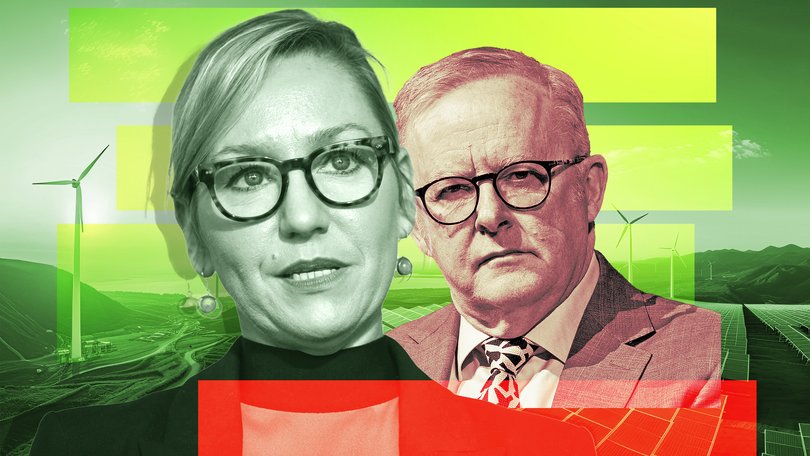Sussan Ley accuses Albanese Government and Greens of making ‘dirty deal’ over new environment law
Opposition Leader Sussan Ley has accused the Government and Greens of doing a ‘dirty deal’ that works against the gas industry and may lead to higher household energy fees.

Australia’s resources industry is bracing for a new fight over the fine print of new environment laws as it also warns that Labor’s deal with the Greens could drive energy prices higher.
Prime Minister Anthony Albanese announced his deal with the Greens on Thursday morning — the final sitting day for the year — saying the “sensible, responsible and balanced laws” were good for business and good for the environment.
“This is a landmark day for the environment in this country. It is also a good day for business in this country, by providing more certainty, reducing delays, and making sure that we get better outcomes and improve productivity,” he said.
Sign up to The Nightly's newsletters.
Get the first look at the digital newspaper, curated daily stories and breaking headlines delivered to your inbox.
By continuing you agree to our Terms and Privacy Policy.“The country’s been held back by environmental laws that were not fit for purpose.”
The laws will establish a National Environment Protection Agency, set up new national environmental standards, and allow the Commonwealth to strike deals for States to assess and possibly approve projects under Federal laws.
In negotiations that Labor and the Greens characterised as tough but constructive, the Greens agreed to back further changes in line with industry group requests to tighten the definitions of “unacceptable impacts” and “net gain” and to put a 14-day limit on the new stop-work orders the NEPA will be able to issue.
But Opposition Leader Sussan Ley accused the Government and Greens of doing a “dirty deal” that worked against the gas industry, after talks with the Coalition collapsed.
“What is absolutely clear is that this is going to put energy prices up and provide further pressure on electricity bills for struggling households and families, for the simple reason that the Greens have got what they want,” she said.
“The Greens Party has always been at war with gas.”
The Greens got Labor to agree to exclude Gas from the new regime for environmental approvals that is meant to fast-track stalled projects.
Australian Energy Producers chief executive Samantha McCulloch called it a “squandered” opportunity.
“Carving gas out of streamlined reforms is simply not in the national interest. The deal will entrench slow approvals which will drive up energy costs,” she said.
The Albanese Government has promised a 14-day limit on stop-work orders, and to clarify the “unacceptable impacts” test and the definition for a clause requiring “net gain” for the environment, but the detail remains unclear.
Minerals Council of Australia chief executive Tania Constable said the Greens deal was an “inferior and disappointing” outcome, warning the amended legislation would increase red tape and open new avenues for legal challenge.
Industry groups are now focused on ensuring the bilateral agreements with the States are struck as quickly as possible to realise the promised productivity gains.
The Government would not put a timeline on striking the bilateral agreements with State Governments but it wants to get at least those with WA and NSW operating under the new rules by July.
Greens leader Larissa Waters said while her party hadn’t got everything it sought, the final package did strengthen environmental protections.
“The Greens are determined to get sh*t done,” she said.
“We are stopping big fossil fuel corporations from trashing the environment faster and easier than they already can – that is a significant win for the climate. But the fight is not over.”
Innes Willox from the Ai Group, which represents big manufacturers who are major customers of the gas companies, said while the gas approvals process “does not go backwards”, it wasn’t “clearly quickened” either.
“It is important, given the pace of development needed to keep meeting current gas demand, that the approvals process does not unnecessarily hold up proposed new projects even as that demand necessarily declines in the decades ahead with energy transition,” he said.
The Association of Mining and Exploration Companies said the deal fell short of full potential, but was still a big step forward.
“The minerals industry will be a primary beneficiary of these changes, which could see projects reduce the time taken to get approvals by more than 12 months,” AMEC chief executive Warren Pearce said.
Environmental groups were disappointed that there hadn’t been any type of climate trigger added to the laws.
Climate Council chief executive Amanda McKenzie said it “fails the climate test” because “all new coal and gas projects still get a free pass on climate pollution”.
Former Treasury boss Ken Henry, who now chairs the Australian Climate and Biodiversity Conservation Foundation, believed the reshaped package would support a modern economy and help create new jobs.
“We simply cannot afford slow, opaque, duplicative and contested environmental planning decisions based on poor information, mired in administrative complexity,” he said.
“The mess of poorly constructed environmental laws has undermined productivity. These reforms promise to fix that mess.”
Once they pass the lower house on Friday morning, the laws will come into effect from mid-2026, when the NEPA will start work, with tougher tests for projects that have “unacceptable impacts” and requirements to deliver a “net gain” to the environment starting in early December 2026.
A Greens request to phase out exemptions for native forestry, meaning logging will have to abide by the new environmental standards, will start from July 2027.
A new $300 million fund will help the forestry industry transition to using plantation timber.

